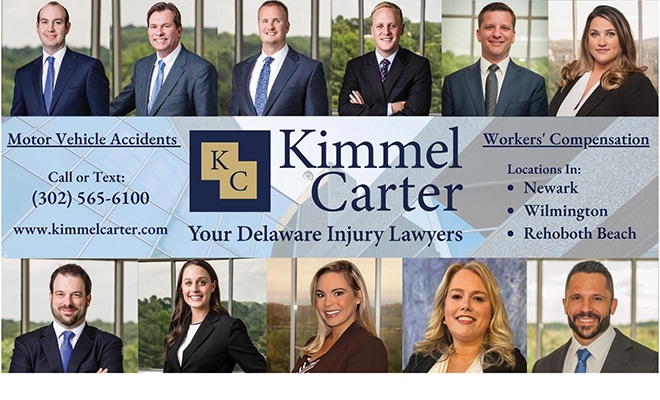Q&A From A Delaware Personal Injury Attorney
 My firm sees dozens of new clients each week and most people have the same questions related to work or car accidents. “Do I have a case?” “Will my wages be paid?” “Which insurance company should I put expenses through?” The list goes on.
My firm sees dozens of new clients each week and most people have the same questions related to work or car accidents. “Do I have a case?” “Will my wages be paid?” “Which insurance company should I put expenses through?” The list goes on.
I should point out that each case has a unique set of facts and so there’s more than one “right” answer to most questions we get. The good news is that a consultation with me is free, so you should reach out!
In the meantime, here are some answers to the more common questions we get.
“Do I have a case?”
Generally, if you have suffered an injury on the job or in a car accident, more than likely you have some type of claim that an attorney can assist you with. In most cases the answer to this question therefore is: YES. What type of claim you have or what benefits/compensation you may be entitled to, however, is a more complicated answer. For example, if you are hurt on the job, commonly we deal with a workers’ compensation claim. However, there are work-related injuries which also involve a claim against another person or company (other than your employer’s workers’ compensation insurance) for the role someone else’s negligence played in causing your injury. Likewise, with car accidents, there may be more than one person at fault for the accident and so we could be dealing with several different claims all as a part of the same case. Again, what type of case or claim you have will depend on the specific circumstances of how you came to be injured. The benefit of getting an attorney involved at the outset is that the worry that goes along with opening all of these potential claims and dealing with insurance companies falls to the attorney, so you can focus on your recovery.
“I was hurt at work or in a car accident. Do I even need a lawyer?”
The technical answer to this question is: No. You can try to DIY, but handling these claims without a lawyer is a little like diagnosing a medical condition yourself using Google. It can be done, but probably not well, and you’re likely not going to get the best outcome.
As a prior insurance defense attorney, I’ve seen the other side’s playbook. Heck, I’ve even helped write some of the plays. I know what you are entitled to, what an insurance company can and more importantly cannot do, and how to ensure that my clients are compensated to the fullest extent of the law. Consulting a lawyer when you’re injured at work or in a car accident is recommended to ensure your rights are protected.
“Can I even afford an attorney?”
That answer is simple: YES. Unlike many lawyers, in injury cases, the lawyers at my firm work under a contingency-fee retainer. That means we do not get paid unless and until we recover something for the injured person. Consultations are free. Get your questions answered. I’ve always liked the saying “knowledge is power,” and that is so true in situations like this. You will not get a bill from me or my firm—ever. Our attorney’s fee only comes once a verdict/settlement/award is secured for our client.
“Can my employer fire me for making a workers’ compensation claim?”
The answer to that question in its simplest form is: No. An employer cannot take retaliatory action against you, such as firing you simply because they are upset that you were injured on the job and are seeking workers’ compensation insurance benefits. Frankly, most employers know that and we rarely, if ever, see that actually happen. However, the big caveat to this very basic rule is that Delaware is an at-will State, which means that an employer may generally discharge an employee for any reason, or no reason, so long as it is not a reason prohibited by law (such as discrimination or retaliation protections). What we do often see is that someone was hurt on the job, has an injury that is taking weeks to months to heal and therefore, is out of work. Due to their absence, the employer looks to find a replacement employee and fills the position while the injured person is out of work. The injured person remains on workers’ compensation but may not have a position to return to once able to return to work.
“I was injured in a car accident that was someone else’s fault. Do I need to open a claim with my own insurance?”
Another simple answer: YES. Delaware insured drivers have personal injury protection, sometimes referred to as PIP. PIP is the primary coverage for your medical bills and lost wages immediately after an auto accident. Therefore, you always want to open a PIP claim through your own insurance. You might be wondering why your insurance is paying bills when the accident was not your fault. First, you’ve already paid for this coverage as a part of your premium and its no-fault coverage—meaning it applies regardless of who caused the accident. Second, it is a much faster way of getting bills and lost wages reimbursed after an accident while you may be out of work. Lastly, it ensures that you personally recover as much as possible from the other driver’s insurance.
“What if the at-fault driver does not have enough insurance to compensate me?”
Generally when the at-fault driver does not have enough insurance to fully compensate an individual, we look back to the injured person’s own insurance policy for something called underinsured motorists benefits. Pro tip: If you haven’t looked at your car insurance in a while, uninsured/underinsured motorist coverage is one of the coverages I would talk to your insurance agent about increasing. Underinsured motorist benefits allow us to recover more money for the injured person on top of what the at-fault party’s insurance provided. There are other considerations that are made when an at-fault party is underinsured, but those are case specific and another reason why consulting a lawyer is important.
“Do we have to, or can we, sue someone personally?”
This answer is more complicated, and I’d have to give you a more lawyerly response: It depends. You can sue the at-fault driver in an accident, but whether you should depends on what their insurance company is offering on their behalf and the specific facts of your case. There are pros and cons to filing a lawsuit and that is why making sure you are working with a lawyer who will explain your options is very important.
Bio
Jen has been an attorney in Delaware for over ten years and has spent the last five years of her career with Kimmel, Carter, Roman, Peltz & O’Neill. Jen specializes in auto accidents, work-related injuries, product liability, wrongful death cases, and toxic tort cases including asbestos and mesothelioma cases.
Jen previously worked for a nationally recognized defense firm where she represented corporations and insurance carriers equipping her with a unique insider perspective that she now uses to advocate for her clients.
Born and raised in Delaware, Jen attended Holy Rosary (Claymont, DE) and is a graduate of Concord High School, University of Delaware, and Widener School of Law. Jen now lives with her husband, Ryan, and two sons, Luke and Cody. In addition to her professional experience, Jen serves on the Executive Board for Kids’ Chance of Delaware. KCOD is a non-profit organization that awards scholarships to children of Delaware workers who have been catastrophically or fatally injured in a workplace accident. She has also volunteered as Guardian ad Litem for minors involved in Family Court proceedings in Delaware through the Office of Child Advocate, is a member of the Holland Inn of Court, Delaware Trial Lawyers Association, and the American Association for Justice.
Testimonials
“My attorney, Jennifer Donnelly, was professional and personable. She explained every detail thoroughly and kept me informed from the beginning to end. I felt she really worked diligently to get me the best possible outcome. I definitely would recommend her.” ~ Maria
“Jennifer was amazing in the two years we worked together. She always went above and beyond for me. I highly recommend her. I couldn’t have asked for a better attorney!” ~ June


